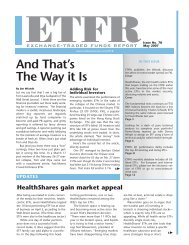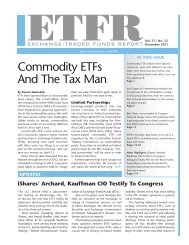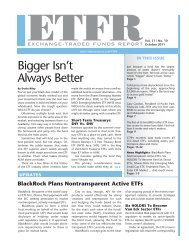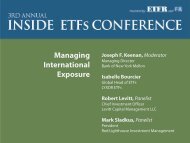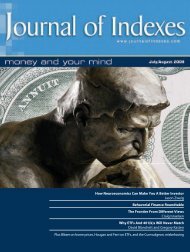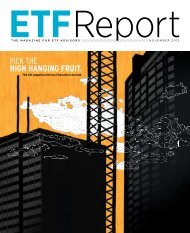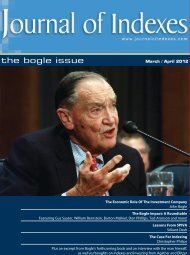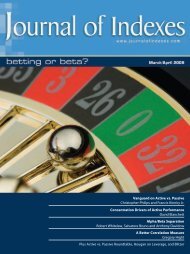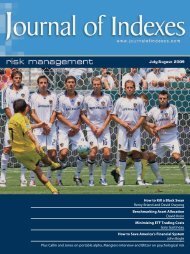Download - IndexUniverse.com
Download - IndexUniverse.com
Download - IndexUniverse.com
Create successful ePaper yourself
Turn your PDF publications into a flip-book with our unique Google optimized e-Paper software.
think no one—neither an individual nor an institution—<br />
ought to attempt to do it.<br />
JOI: Should investors be concerned about inflation during the<br />
near term? If so, how can they protect themselves against it?<br />
Malkiel: My sense is that individuals should not be concerned<br />
about inflation over the near term. I think they<br />
should be far more worried about deflation. The world is<br />
awash with excess capacity, and I think all of the pressures<br />
are going to be on the other side; that is, for falling prices<br />
rather than rising prices.<br />
Over the longer pull, I think that inflation is a possibility. I<br />
think it’s a possibility because there is an enormous amount<br />
of liquidity sloshing around the world. Central banks, such<br />
as the Federal Reserve, have expanded their balance sheets,<br />
and there’s no doubt in my mind that eventually that excess<br />
liquidity is going to have to be mopped up.<br />
And I think politically, with very high unemployment and<br />
continuing high unemployment, it’s unlikely that any central<br />
banks are going to do the mopping up early rather than<br />
later. So I think there is a longer-run danger of inflation. But<br />
over the near term, I think absolutely not.<br />
Now, how do you protect yourself against inflation?<br />
I think the only thing you can do is have a very broadly<br />
diversified portfolio. And what that means is that in your<br />
portfolio you’re going to have equities, which are a longrun<br />
inflation hedge, and within those equities, you’re<br />
going to have raw material producers that will certainly<br />
help if there’s long-run inflation. You will have positions<br />
in emerging markets such as natural-resource-rich countries<br />
such as Brazil. And I think that’s the only sensible<br />
thing for anyone to do. The portfolio ought to be broadly<br />
diversified. It ought to have some bonds, which will certainly<br />
be very good in a deflationary environment, which<br />
is what I expect over at least the next year or so. But it<br />
ought to have equities, including equities of <strong>com</strong>panies<br />
that produce raw materials.<br />
So, diversification is, I think, the answer to investors.<br />
You ought to have a portfolio that will work well in any<br />
environment.<br />
JOI: Have you adjusted your investment philosophy during the<br />
last two years?<br />
Malkiel: The one change in my thinking on investing and<br />
asset allocation is that the emerging economies of the world<br />
are continuing to grow, and grow rapidly. Within the next<br />
few years, particularly adjusted for purchasing power, China<br />
will exceed Japan as the world’s second-largest economy.<br />
And I think before too long, adjusted for purchasing<br />
power, China will be bigger than the United States. So the<br />
one adjustment that I have made is, along with the increased<br />
importance of emerging markets such as China, such as<br />
Brazil, I have, for myself, changed the equity allocation to<br />
include a much heavier <strong>com</strong>mitment to these markets, and I<br />
think all individuals should do so.<br />
JOI: What do you see as the biggest danger/opportunity for<br />
investors over the next five years?<br />
Malkiel: Well, the share of world GDP has been growing rapidly<br />
for emerging markets. Those are where I see the opportunities.<br />
Now, where would I see the longer-run dangers? Again,<br />
while I say I do not expect any kind of inflation over the<br />
next year, over the next two years, I do see potential inflationary<br />
dangers over a longer period. I think that, paradoxically,<br />
probably the safest security you can buy—the 10-year<br />
Treasury at 3.25 percent —worries me, because I think if we<br />
have even some moderate inflation of 2 to 3 percent breaking<br />
out three or four years from now, those will not prove to<br />
be profitable investments.<br />
Larry Swedroe, Principal and Director<br />
of Research, BAM Advisor Services<br />
JOI: Is buy-and-hold investing dead?<br />
Swedroe: I almost have to laugh whenever<br />
I get a question like that. It’s similar to<br />
the question, “Is diversification dead?”<br />
Whenever we get some kind of crisis, all those who believe<br />
in active management <strong>com</strong>e out of the woodwork with<br />
this nonsense. All that shows is that they don’t know the<br />
basics of investing. Any student of history and investing<br />
would know that during a financial crisis that is systemic<br />
around the globe, the correlation of all risky assets always<br />
go towards 1. It has happened many times before.<br />
But still, they <strong>com</strong>e out of the woodwork …<br />
There was actually an article in [the Oct. 11, 2009 issue<br />
of] Investment News, titled, “The days of buy-and-hold have<br />
gone and went.” So let’s deal with that issue.<br />
It’s a very simple mathematical fact―which William Sharpe<br />
demonstrated in his nice little paper called “The Arithmetic of<br />
Active Management,”―that active management must lose in any<br />
environment or any asset class. Anyone who says otherwise<br />
should be required to wear a shirt that says, “I can’t add,” in big,<br />
bold letters. There are only two types of investors: active or passive.<br />
So, let’s say you are a passive investor and you just want<br />
to own Vanguard’s Total Stock Market Fund [NYSE Arca: VTI].<br />
If the market goes up 10 percent, before expenses, you must<br />
get 10 percent, as all passive investors do. And that means, in<br />
aggregate, the active investors have to get 10 percent, before<br />
costs. The same math applies in down markets.<br />
Since active investors have higher expenses, active investors<br />
must lose after costs. As Sharpe points out in his article,<br />
anyone who produces a study that finds anything different is<br />
simply measuring the wrong things.<br />
JOI: Should investors be concerned about inflation during the<br />
near term? If so, how can they protect themselves against it?<br />
Swedroe: Let me say it this way: William Sherden was an<br />
economist called to testify in front of Congress on nearterm<br />
inflation. He got the brilliant idea to say, “You know<br />
what? I ought to check the track records of these other<br />
geniuses like me who have previously been called to testify<br />
on the outlook for inflation and see if they got it right.”<br />
And guess what he found? He found these geniuses had no<br />
better forecasting record than what is called the naive fore-<br />
continued on page 62<br />
www.journalofindexes.<strong>com</strong> January/February 2010<br />
39




